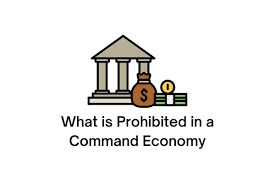Are you curious about what you can’t do in a command economy? Well, look no further!
In this article, we’ll explore the restrictions and limitations that are placed on individuals and businesses in a command economy.
From restrictions on private property ownership to limitations on entrepreneurship and business startups, we’ll cover it all.
So, let’s dive in and discover what is prohibited in a command economy!
Limitations on Private Property Ownership
You can’t expand your land beyond the set limits in order to respect the limitations on private property ownership.
In a command economy, the government controls all the resources and determines how they’re allocated. This means that you have no say in how much land you can own or how you can use it.
The government sets strict boundaries on private property ownership to ensure that resources are distributed evenly among the population. This can be frustrating if you have aspirations of expanding your land or starting a business that requires more space.
However, the intention behind these limitations is to prevent the concentration of wealth and power in the hands of a few individuals. By imposing these restrictions, the government aims to promote equality and prevent exploitation.
Restrictions on Entrepreneurship and Business Startups
Starting a business in a command economy can be challenging due to the numerous restrictions and regulations placed on entrepreneurship and business startups. In a command economy, the government has significant control over the allocation of resources and the means of production. This often means that aspiring entrepreneurs must navigate through a complex web of bureaucratic red tape and obtain numerous permits and licenses before they can even begin operating.
Additionally, the government may impose strict regulations on pricing, production levels, and the types of goods and services that can be offered. These restrictions can limit the ability of businesses to innovate, grow, and compete in the market.
Overall, starting a business in a command economy requires patience, persistence, and a thorough understanding of the government’s regulations and requirements.
Control Over Resource Allocation and Production Decisions
Having control over resource allocation and production decisions allows the government to shape the economy according to its priorities and objectives. In a command economy, the government takes full control of these crucial aspects.
By doing so, they can direct resources towards industries that they deem important for the nation’s growth and development. This control also enables the government to prioritize the production of goods and services that align with its objectives, whether that be increasing employment, promoting exports, or fostering technological advancements.
However, this level of government control also has its drawbacks. It can lead to inefficiencies, as decision-making power is concentrated in a few hands. It may stifle innovation and competition, as the government may favor certain industries over others.
Striking a balance between government control and market forces is crucial for a well-functioning economy that benefits its citizens.
Censorship and Limitations on Freedom of Speech
There are many instances where censorship and limitations on freedom of speech have been implemented in various countries, hindering the expression of diverse viewpoints.
In some countries, governments restrict access to certain information or block websites that criticize their policies. Journalists and activists who speak out against the government are often silenced or even imprisoned.
Social media platforms are also subject to censorship, with posts and accounts being deleted if they go against the government’s narrative. This suppression of freedom of speech not only violates people’s fundamental rights but also stifles public discourse and hinders the growth of democratic societies.
It’s crucial for individuals and organizations to continue advocating for freedom of speech and fighting against censorship, ensuring that everyone has the right to express their opinions and ideas without fear of reprisal.
Prohibition of Free Market Competition
You should understand that the prohibition of free market competition can have detrimental effects on both consumers and businesses. When competition is restricted or eliminated, consumers are left with limited choices and higher prices. Without the pressure to compete, businesses may become complacent, leading to a decrease in innovation and quality.
In a monopolistic or oligopolistic market, there’s little incentive for companies to improve their products or offer better customer service. Additionally, without competition to drive down prices, businesses can charge exorbitant prices, taking advantage of the lack of alternatives available to consumers.
Ultimately, the prohibition of free market competition can stifle economic growth, limit consumer choices, and harm both businesses and consumers in the long run. It’s important to foster a healthy competitive environment for the benefit of all stakeholders involved.
Price Controls and Limitations on Pricing Mechanisms
Price controls and limitations on pricing mechanisms can have negative effects on the economy and lead to inefficiency in market allocation. When the government sets maximum prices, it may result in shortages and black markets as suppliers are unable to meet consumer demand.
Additionally, restrictions on pricing mechanisms can discourage innovation and competition, hindering economic growth and development.
Negative Effects of Controls
Don’t overlook the damaging consequences of excessive controls on businesses and consumers alike. When controls are implemented without careful consideration, they can stifle innovation and growth. Businesses may be burdened with excessive regulations, making it difficult for them to operate efficiently and effectively. This can lead to decreased productivity and limited opportunities for expansion.
Consumers, on the other hand, may face limited choices and higher prices due to the lack of competition. Excessive controls can also discourage entrepreneurship and investment, as businesses may be hesitant to take risks in a heavily regulated environment.
Ultimately, the negative effects of excessive controls can hinder economic development and reduce overall prosperity. It’s important to strike a balance between necessary regulations and allowing businesses and consumers the freedom to thrive.
Inefficiency in Market Allocation
There are multiple factors contributing to the inefficiency in market allocation, such as government regulations and limited competition.
In a market where there are numerous regulations imposed by the government, businesses often face barriers to entry and excessive bureaucratic red tape. This hinders the smooth functioning of the market and limits the ability of businesses to compete on a level playing field.
Additionally, limited competition in certain industries can lead to monopolies or oligopolies, where a few dominant players control the market. This lack of competition reduces the incentive for businesses to innovate, offer better products or services, and keep prices competitive.
As a result, consumers may face higher prices, reduced choices, and lower quality products or services.
Overall, addressing these factors is crucial to improving market efficiency and ensuring fair competition.
Restrictions on Imports and Exports
When it comes to restrictions on imports and exports, it’s important to understand the reasons behind them.
These limitations are often put in place to protect domestic industries and ensure economic self-sufficiency.
However, they can also have significant implications for global markets, creating trade imbalances and impacting overall economic growth.
Trade Limitations Explained
You should understand the trade limitations explained in the current discussion topic.
Trade limitations are restrictions put in place by governments to control the flow of goods and services across borders. These limitations can take various forms, such as tariffs, quotas, and embargoes.
Tariffs are taxes imposed on imported goods, making them more expensive and less competitive in the domestic market.
Quotas, on the other hand, limit the quantity of certain goods that can be imported or exported.
Embargoes completely ban the trade of specific goods with certain countries.
These trade limitations are often implemented to protect domestic industries, maintain national security, or address trade imbalances.
Understanding these limitations is important as they can have significant impacts on international trade and global economies.
Economic Self-Sufficiency Implications
You must consider the economic self-sufficiency implications when analyzing restrictions on imports and exports.
In today’s globalized world, countries heavily rely on international trade to meet their needs and promote economic growth.
However, imposing restrictions on imports and exports can have both positive and negative effects on a nation’s self-sufficiency.
On one hand, limiting imports can protect domestic industries and promote the production of goods and services within the country, leading to increased self-sufficiency.
On the other hand, restricting exports can limit access to foreign markets and reduce the revenue generated from international trade.
This can hinder economic growth and hinder the development of industries that rely on exporting.
Therefore, it’s crucial to strike a balance between protecting domestic industries and promoting international trade to ensure economic self-sufficiency without stifling economic growth.
Impact on Global Markets
To fully understand the impact on global markets, consider the effects of restrictions on imports and exports.
When countries impose limitations on the movement of goods across borders, it can have far-reaching consequences.
Firstly, restrictions on imports can protect domestic industries by reducing competition. This can lead to higher prices for consumers and limited choices.
On the other hand, restrictions on exports can limit the growth potential of industries and hinder economic development. It can also strain diplomatic relationships between countries, leading to trade wars and retaliatory measures.
Additionally, restrictions on imports and exports can disrupt global supply chains, affecting businesses and consumers worldwide.
It’s crucial to carefully weigh the benefits and drawbacks of such restrictions to ensure a balanced approach that promotes economic growth and stability in the global marketplace.
Lack of Individual Consumer Choice
You can’t choose the products you want to buy because the government controls the market in a command economy. In this type of economic system, the government has complete control over the allocation of resources and the production of goods and services.
As an individual consumer, you have limited say in what products are available to you. The government determines what products are produced, how much is produced, and at what price they’re sold. This lack of individual consumer choice can lead to a limited variety of goods and services in the market. Additionally, it can result in shortages of certain products or the production of goods that may not align with consumer preferences.
Overall, the government’s control over the market in a command economy restricts your ability to freely choose the products you want to buy.
Limitations on Foreign Investment and Capital Flows
If the government imposes restrictions on foreign investment and capital flows, it can limit economic growth and hinder the expansion of businesses. These limitations on foreign investment can have significant consequences for the economy.
When foreign investors aren’t allowed to invest in local businesses, it restricts the amount of capital that can be injected into the economy. This can lead to a lack of funds for businesses to expand, invest in new technologies, and create jobs.
Additionally, restrictions on capital flows can hinder the ability of businesses to access financing for their operations. Without access to capital, businesses may struggle to grow, innovate, and remain competitive in the global market.
Therefore, it’s important for governments to carefully consider the potential negative impacts of imposing restrictions on foreign investment and capital flows.
Conclusion
In a command economy, you’ll face numerous prohibitions and limitations. Private property ownership, entrepreneurship, and free market competition are all restricted. There are also controls over resource allocation, production decisions, and pricing mechanisms.
Censorship and limitations on freedom of speech are prevalent. Additionally, there are restrictions on imports, exports, individual consumer choice, and foreign investment.
These limitations result in a lack of economic freedom and can hinder overall economic growth and development.


